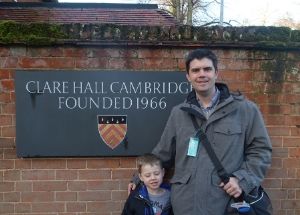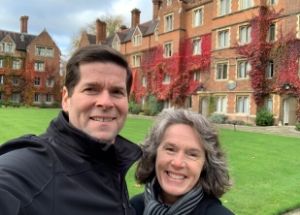Enjoying the Fellowship of Clare Hall: Professor Tom McSweeney and Professor Brent Allred
William & Mary professors Tom McSweeney and Brent Allred did not know that each had been selected as Visiting Fellows at Clare Hall, a college of the University of Cambridge, for the fall 2019 semester. In fact, they did not know each other at all. They traveled to the U.K. with their families and settled into apartments that, as it turned out, bordered the same college garden. McSweeney guesses that they had crossed paths at William & Mary, because a few days after he arrived he recognized Allred as a familiar face as he scrolled through the roster of new fellows. He took a closer look, then reached out to Allred to introduce himself. The professors and their families soon met and struck up a warm friendship.
For Allred, a professor at the Raymond A. Mason School of Business, and McSweeney, a professor at William & Mary Law School, the semester-long residencies at Clare Hall offered time to concentrate on their scholarship, engage with an international group of fellows and graduate students from different disciplines, and enjoy Cambridge’s centuries-old grounds, history and traditions.
Clare Hall is “relatively young,” observes McSweeney. It was created in 1966 as a center for advanced study within Clare College, which was founded in 1326 and is the second oldest of Cambridge’s 31 colleges. Clare Hall became an independent college within the university in 1984, and its community today comprises university faculty and staff, graduate students and Visiting Fellows. Visiting Fellows become Life Members after completing their residencies and are welcome to return to Clare Hall for work or pleasure for the rest of their lives.

McSweeney says that one of the special benefits of the fellowship was the access it gave him to the large collection of “statute books” in Cambridge University Library. These books usually contain short treatises on the common law, some of which date to the late thirteenth century.
“These treatises constitute some of the earliest evidence for legal education in the common law,” he says, with a number that seem “to derive from lecture courses that we otherwise know nothing about.” Among the treatises, the Summa de Bastardia (“The Treatise on Bastardy”) captured his attention. “It’s a Latin text written in the form of hypothetical cases on illegitimacy and how that affects inheritance,” he explains, and notes that the abundance of surviving manuscripts in which it appears would indicate “it must have been wildly popular.” Yet, it has received scant scholarly attention. He focused much of his stay at Clare Hall on translating the text and looking for clues for the date it was written. He also had the chance to share his work with historians of English law through papers he gave at Cambridge’s Centre for English Legal History and Oxford’s Legal History Forum.

Allred is an expert in strategic management and international business and enjoyed the fellowship as an opportunity to focus his energy on research, with ample time to write and engage with scholars from other fields. His wife, Kristyn, found the environment particularly conducive for her own research on diversity and inclusion.
His recent research explores anonymous shell corporations, which often are associated with criminal activity. His work investigates a wide range of issues, including the factors that influence their creation by corporate service providers and the ease with which they are created, despite efforts to thwart them though international agreements and laws.
A presentation that Allred made to an audience of graduate students and fellows at Clare Hall, who hailed from around the world and from diverse disciplines, was among the most gratifying experiences of his time at Cambridge. “When I presented my research, there was not a single person from business who attended,” he recalls. “I had another fellow come up afterward and tell me that she had never really been interested in business and that my presentation had changed her perspective.”
Both professors enjoyed lectures, seminars and special events hosted by Clare Hall and other colleges across the Cambridge campus. For Allred, Cambridge’s “Festival of Ideas,” a two-week series of presentation on hundreds of different subjects, left a lasting impression. McSweeney says, “I really learned to appreciate the Cambridge collegiate system while I was there, partly because there are a lot of mechanisms for fostering conversation between people in different fields. At Cambridge, you’re affiliated with a department or faculty of the university, and those are divided by academic discipline, but you’re also a member of a college, and the colleges bring together students and faculty from all different fields.”
Both professors agreed that it was around tables in the commons where they had some of their most memorable and enjoyable conversations. “Clare Hall created an amazing community experience, especially around lunch and dinner,” says Allred. McSweeney recalls being “seated next to a lawyer from Libya at one dinner and an education student from Kazakhstan at another.” During lunch, Brent and Kristyn Allred would try to meet different people each time they dined. In one instance, they sat next to a couple they did yet not know, only to find out that one of them was a vice president at the Hebrew University of Jerusalem, where Allred was going to be spending the second half of his leave. It happened that the vice president’s area of responsibility included international scholars, so this was a perfect introduction. It is a small world, indeed.
When asked about some of the happiest memories of his time at Cambridge, Allred mentioned how much he and his wife enjoyed casual get-togethers with newly made friends, which included, for instance, a celebration of Finland’s Independence Day. For McSweeney, it was the morning that his wife, Abby, and their two young children stopped to watch a university procession to Great St. Mary’s Church. “I read up on the Cambridge traditions before we went, so I pointed out the proctors carrying the leather-bound university statute books to the kids. I really think we need proctors carrying leather-bound statute books at William & Mary’s academic processions,” he jokes. “I will volunteer to do that.”